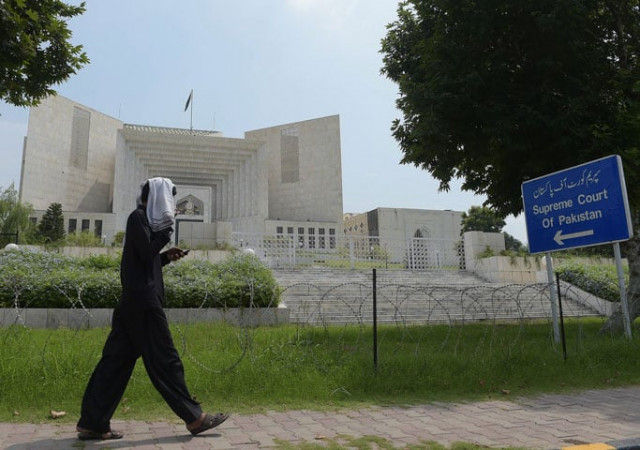Supreme Court's year of transition
Top court issued some landmark rulings even as it changed through three chiefs

Rs75,305 is the average cost of disposing of a case in 2015. PHOTO: AFP
Justice Nasirul Mulk, who headed the judiciary for much of 2015 before his retirement in August, carried forward the policy of judicial restraint of his predecessor, Justice Tassaduq Hussain Jillani staying away from the affairs of other institutions, taking few suo motu notices and focussing the attention on disposing cases of ordinary litigants.
Supreme Court upholds establishment of military courts
Earning the badge of 'English Judge', Justice Mulk led the probe into allegations of rigging in the May 2013 elections, levelled by the Pakistan Tehreek-e-Insaf. For 86 days Justice Mulk conducted proceedings before rejecting the allegations. All major political parties hailed Justice Mulk's conduct during the proceedings of the inquiry commission.
He also oversaw the landmark ruling where a majority of the SC judges endorsed the 21st constitutional amendment on establishing military courts to try terrorists, even as the judiciary maintained that the apex court reserved the authority to review any constitutional amendments.
Justice Mulk was succeeded briefly by Justice Jawwad S Khawaja. Considered close to Justice Chaudhry, Justice Khawaja revived judicial activism for the 23 days he remained at the helm.
Justice Khawaja takes oath as Chief Justice
Though his brief stint, he had been involved in some landmark decisions and cases. He pushed the federal government on implementing the National Action Plan culminating in improved monitoring of funding sources for NGOs.
He also took up a number of public interest cases, including the Kutchi Abadi case and functioning of the Defence Housing Authority. He also oversaw verdicts banning hunting of the Houbara bustard in the country and adopting Urdu as the official language.
However, he had a testing relationship with the bars with the Supreme Court Bar Association refusing to host a farewell dinner for him.
With his short reign over, Justice Khawaja was succeeded by Justice Anwar Zaheer Jamali. In his very first speech after taking oath, Justice Jamali outlined his plans to make the Supreme Judicial Council more effective for hearing complaints filed under Article 209 against the judges of the superior courts.
In his tenure so far, he has been involved in some key cases and landmark verdicts. He took notice of a Lahore anti-terror court acquitting five men accused of murder, including the son of former state minister Siddique Kanju.
A three-judge bench, headed by CJP Jamali, declared the composition of the Federal Service Tribunal as illegal and directed the government to de-notify its chairman and 11 members. In a separate case he barred the Prime Minister's special assistant on aviation from participating in the affairs of the aviation division.
SC upholds death sentence for Salmaan Taseer's killer
He also oversaw the landmark judgement in the Mumtaz Qadri case, rejecting a clemency plea from the self-confessed killer of former Punjab governor Salmaan Taseer as the court directed the state to ensure that no innocent is compelled or constrained to face an investigation or trial on false charges of blasphemy.
Despite the flurry of activity, one section of lawyers still adhering to the methods of former chief justice Chaudhry felt that important issues were not picked up by the top court such as mega scandals and case of missing persons (which seems to have died with the demise of Justice (retd) Javed Iqbal).
Rare action: AGP Buland Rana shown the door
Ironically they were backed up by a group of lawyers associated with the Pakistan Peoples Party. They complained that the court was not as aggressive over government working as compared to Justice Chaudhry who had given the previous administration a torrid time.
While the number of cases lodged in the apex court rose from 2014, the ratio of applications filed to the human rights cell fell.
Elsewhere, the SC's annual report for 2014-15 though noted that the average cost for disposing of a case had risen to Rs75,305.
The Supreme Judicial Council also probed allegations of misconduct against Auditor General of Pakistan Akhtar Buland Rana. The findings of the probe eventually resulted in removal of Rana.



















COMMENTS
Comments are moderated and generally will be posted if they are on-topic and not abusive.
For more information, please see our Comments FAQ